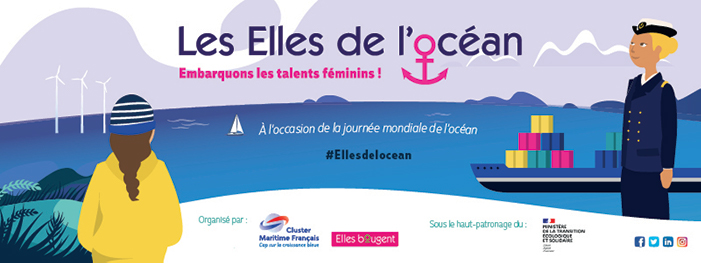8 June 2020
Marie Sciboz

The Louis Dreyfus Armateurs Group joins the Cluster Maritime Français (CMF) and the Association Elles Bougent to celebrate women on the occasion of this World Ocean Day 2020 and through the operation “Les ELLES de l’Océan“.
This special operation aims to promote the place of women in the maritime sector and to make young women aware of career opportunities related to the sea.
Discover now the interview by our colleague seafarer Marie Sciboz.
Interview
1 / Could you introduce yourself?
My name is Marie Sciboz and I have been working as a Hydrographic Surveyor for Louis Dreyfus Armateurs since 2014.
2 / Where does your interest in navigation/the sea/the merchant navy come from? Why did you make this career choice ?
My father owns a wreck research and underwater expertise company – unsurprisingly, I have been involved in the maritime environment from a very young age. I started to learn sailing as a child and I have taken a liking to navigation over the years.
Accustomed as I was to out-of-sync family rhythms and the pleasure of travelling, I was looking for a job that could combine both and the merchant navy provided it.
3 / What did you study ? What is your academic background?
After my French baccalaureate diploma, I looked for a training in the maritime sector outside metropolitan France as I was keen to travel. I took a training course at the University of New Caledonia and got a scientific and technical degree in Marine Geoscience.
I then enrolled at the well-respected CNAM Intechmer Institute (National Institute for Marine Sciences and Technologies) in Cherbourg, the only French school providing training to marine technicians. This school was in my opinion the best option to combine navigation and oceanography and I got a Bachelor’s degree in Ocean Exploration & Surveying.
4 / What do you like most about your job?
I really enjoy the ever-renewing aspect of this job : each boarding is different from the previous one. There is always an initial phase where we have to get familiar with the ship and other crew members and everything after that is a different experience.
I also like the fact that life on board and life on land are neatly separated. When we go on a mission for two months, 100% of our time is spent at our workplace, which becomes our living place and a space for some time off as well. We do not have to deal with anything else.
When we spend a two-month vacation on land, the same principle applies : we can dedicate our full time to ourselves and our families.
As restrictive and challenging this rhythm can be, it allows us to be 100% available for our families during the time spent on land.
5 / What do you think of the representation of women in the maritime sector?
It has been growing – perhaps as part of a fashionable trend – but remains very low in proportion.
Although the merchant navy seems to be recruiting more and more women out of school, the biggest effort, in my opinion, resides in keeping women in their seafaring occupations over time: the percentage of women with a long-term experience at sea is still very low.
6 / What advice would you give to young women to make them aware of the career options offered by this sector?
As a mother-of-two (soon to be three), I would like to say to all women who work at sea that this should not be an obstacle to family life, and vice versa.
It is not always easy but you should not give up, because being able to combine your dream job with a fulfilled family life is something to be proud of.
Many experienced, male seafarers are also fathers, so why could it not be the same for mothers ?!
****
Thank you Marie for this interview !

